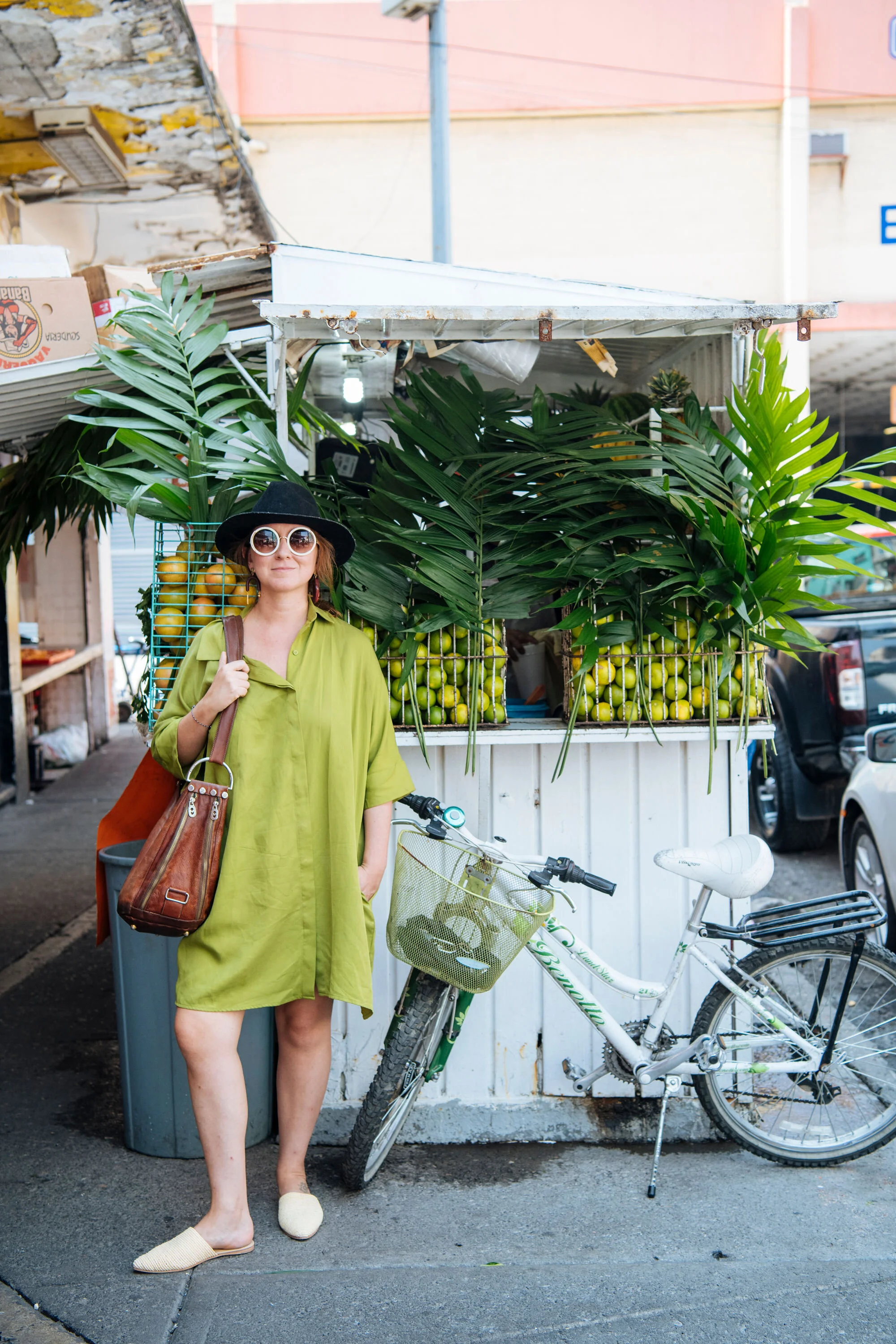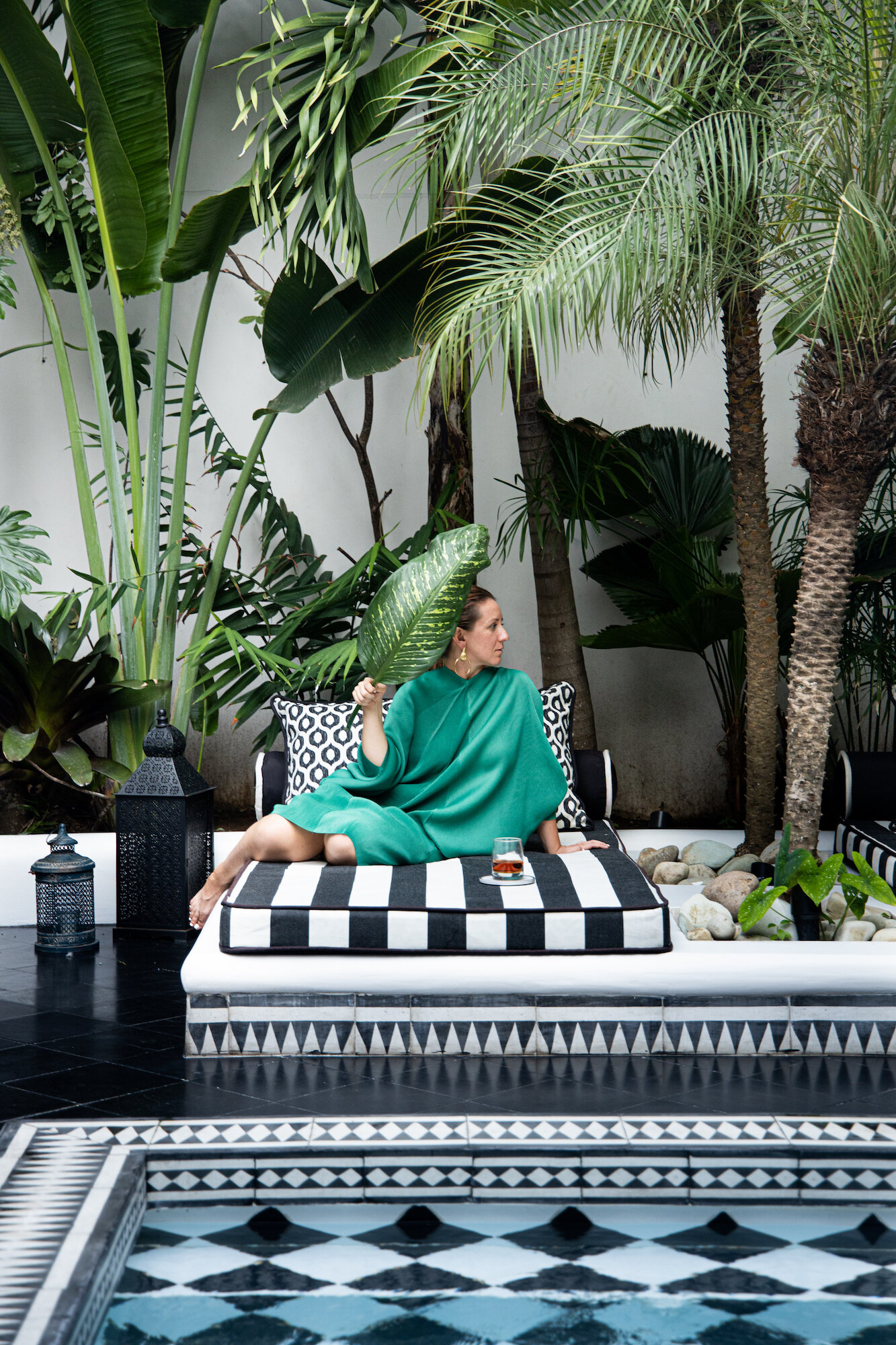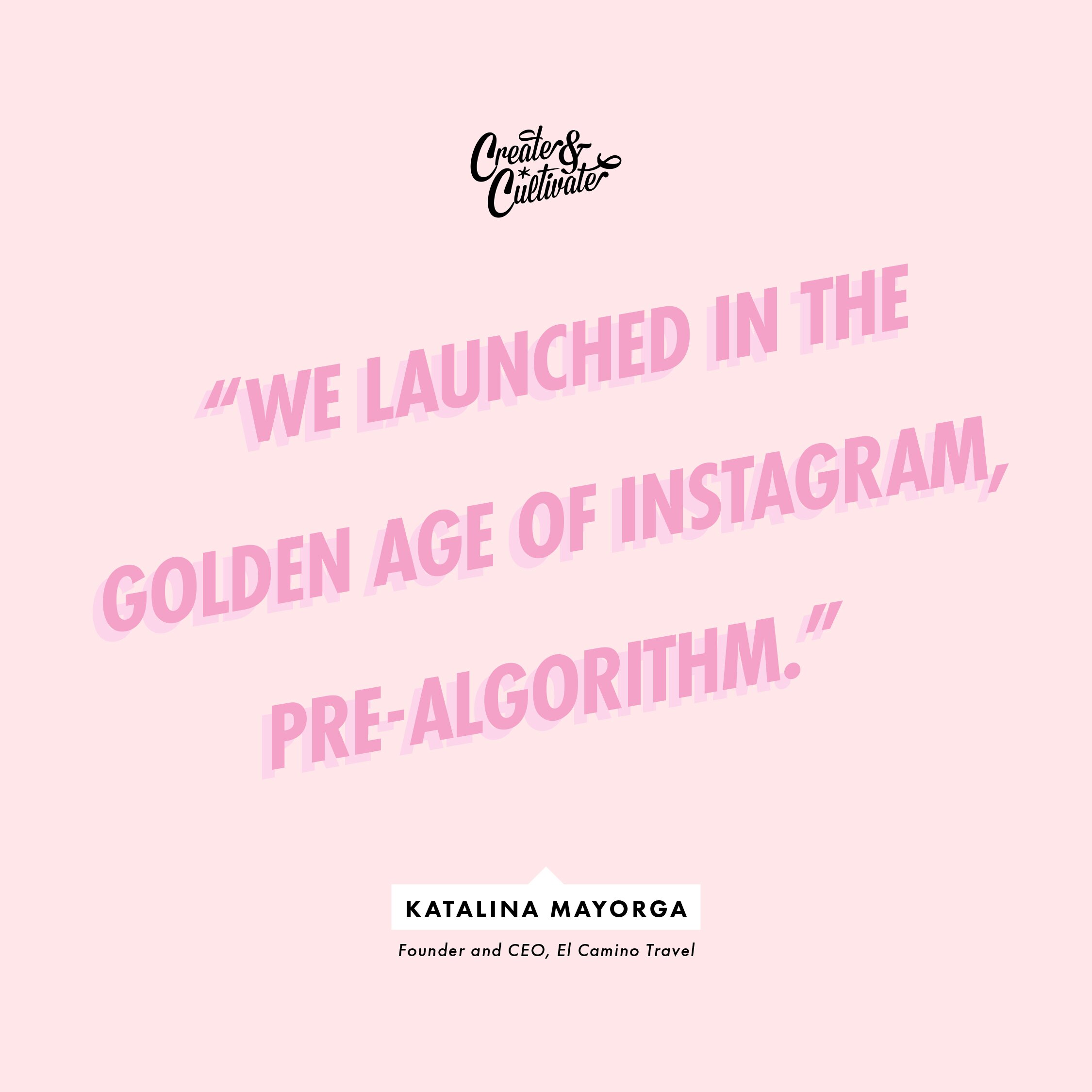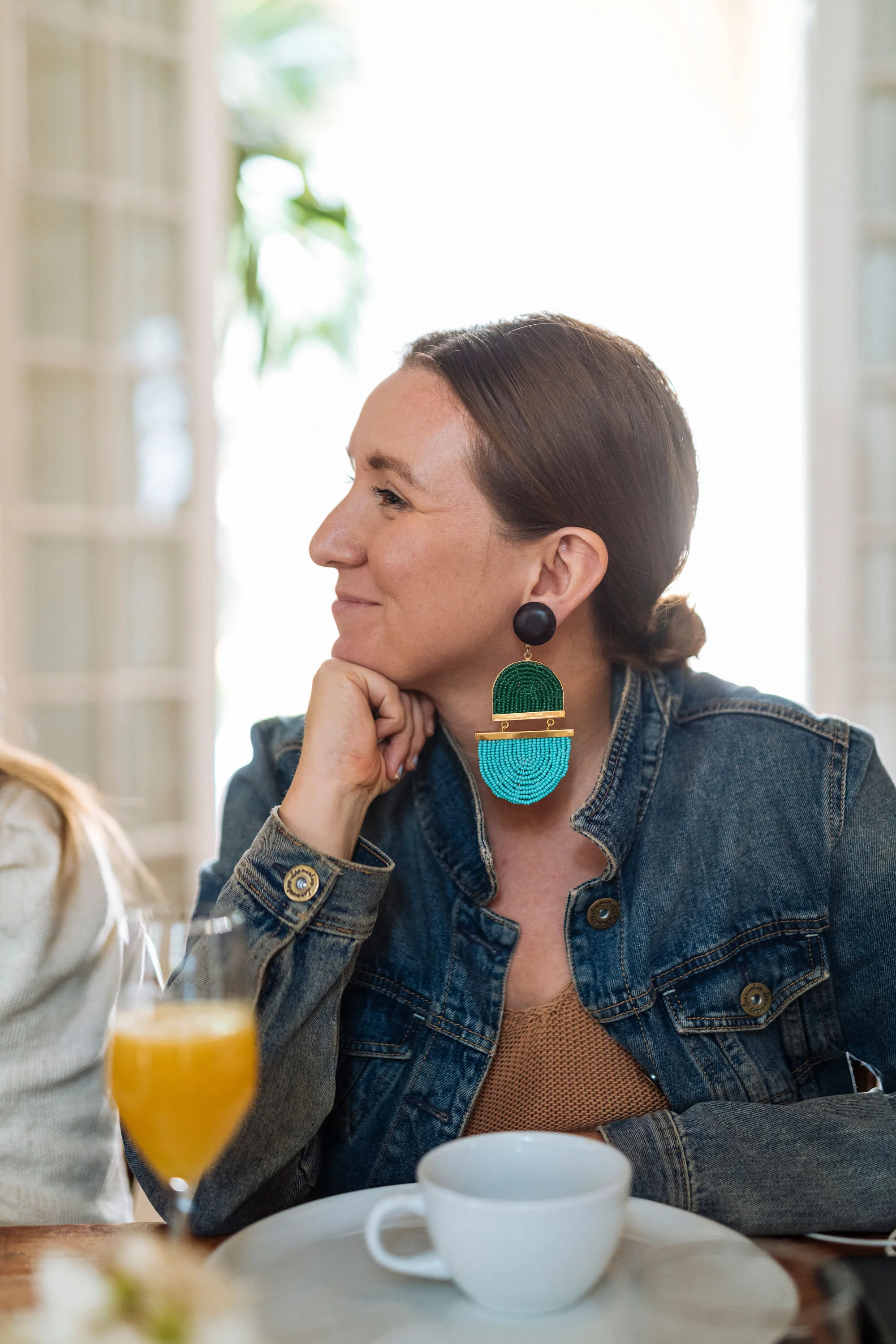We know how daunting it can be to start a new business, especially if you’re disrupting an industry or creating an entirely new one. When there is no path to follow, the biggest question is, where do I start? There is so much to do, but before you get ahead of yourself, let’s start at the beginning. To kick-start the process, and ease some of those first-time founder nerves, we’re asking successful entrepreneurs to share their stories in our series, From Scratch. But this isn’t your typical day-in-the-life feature. We’re getting into the nitty-gritty details of launching a business, from writing a business plan (or not) to sourcing manufacturers and how much founders pay themselves—we’re not holding back.
Photo: Alina Tsvor Courtesy of El Camino Travel
Katalina Mayorga was busy building a career in international development when a brief conversation with a cab driver in Guatemala changed everything. The chat inspired her to leave her full-time job behind and launch a travel company dedicated to bringing tourism dollars to less-frequented destinations where they could truly make an impact on local economies. Since founding El Camino Travel in 2014, Mayorga has collaborated with local guides to bring intrepid travelers to the palm tree-lined beaches of Colombia, the salt flats of Bolivia, and other off-the-beaten-path places throughout Latin America.
Then COVID-19 hit. The rapidly spreading disease upended the travel industry overnight, and like so many entrepreneurs with businesses rooted in hospitality and tourism, Mayorga suddenly had to reexamine her business model. “While it is daunting, it is also somewhat exciting, because no one really has any idea what the ‘new normal’ will look like in our industry,” the founder tells Create & Cultivate. “This experience has forever changed travel and how it will operate moving forward, which means that despite being a small business, we can still have a large impact on how the industry builds from the ashes of COVID-19.”
Read on to find out how this enterprising entrepreneur built her business from the ground up (without a traditional business plan or a single investor) and how she’s pivoting to ensure El Camino Travel comes out on the other side of the COVID more resilient than ever.
On forgoing a traditional business plan…
“In the early stages of the business, it was important to test out different ideas, revenue streams, and types of trips to see what actually was viable to fill a gap in the market. I needed the flexibility to iterate and change course without being stuck on one way of doing business or feeling like I had wasted time by creating a thorough business plan (which often can be several pages long) that I would not end up using. Instead, I used the Lean Canvas framework, which allows you to start strategically thinking through the most important components of a successful business. I also found the book The Lean Startup by Eric Reis helpful.”
On coming up with the name El Camino Travel…
“It was truly a shower moment. I’d thought of several names (none of which I remember anymore), but when I tested them out on people, I got a lot of hesitation or no reaction at all. I wasn’t very excited about them either and knew in my gut they weren’t a good fit. After several weeks, the name finally hit me in the middle of a shower and I immediately ran out and yelled to my husband (who was downstairs), ‘I think I have it! El Camino Travel!’ He responded with a big smile and said, ‘That’s it Kata!’”
“I went back out into the world with that name and realized how sticky it was. Friends loved it and I loved saying it. I think this is a perfect example of one of the most important lessons that I have learned in business. Go let your ideas live in the wild before fully committing to them. Talk to people about them and immediately start testing their viability and marketability. You do not have to tell everyone everything, but do not be so concerned that someone is going to steal your idea. As someone told me early on with El Camino, ‘That’s a brilliant idea, but don’t think that no one else has ever thought of it. It is all about who runs faster and harder with the idea.’”
Photo: Jennifer Chase Courtesy of El Camino Travel
On setting up the business…
“The most important thing is having a strong operating agreement in place. This was a huge lesson learned for me because our first operating agreement is one we got through Legal Zoom. These operating agreements are not enough to address very common issues many entrepreneurs face early on in their business. The best investment you can spend early on is getting a legitimate lawyer that can help you put together a robust operating agreement. Remember that as your business grows, you may need to change your operating agreement to reflect that growth. We are on our third iteration in six years.”
On standing out from the competition…
“To really set yourself apart in your specific niche or industry, seek inspiration from outside your industry. Look at innovative models and branding that you really admire that have nothing to do with your business and use that creative inspiration to help set you apart in your own industry.”
“Though we are a travel brand, I sought out a ton of inspiration from my work in international development, lifestyle brands that I admired, architecture and design firms, and documentary photojournalism. While the internet makes the world a much bigger place to seek out various resources, it is also very easy to get caught up in your own industry bubbles and to all be drinking the same Kool-Aid and using the same buzzwords. Force yourself to break out of that.”
On finding local guides to partner with…
“When we launched, I was the local host for almost all our trips for the first two years and I still host two very special trips a year, our Community Retreats. I loved being a host, and it was important for me to have that hands-on experience because it made me understand the intricacies and challenges of the most important role of the trip. It also gave me a strong understanding of what qualities makes an excellent local host.”
“Though I think I am a pretty good host, I knew that having someone who was born and raised in the place we are visiting would add a whole other level of insight or value that I knew I (or any other outsider) wouldn’t be able to provide. This was actually somewhat contradictory to the industry model at the time that valued guides from Western countries or who were from the same places as the travelers.”
“Something felt inherently wrong with that model and not true to our own values. We now exclusively only hire guides from the countries we are visiting and who have interesting perspectives and stories to share with our travelers. They also must be incredibly responsible and detail-oriented.”
Photo: Emmy Hernandez Jiminez Courtesy of El Camino Travel
On funding the company…
“We started through a mix of savings, credit card debt (not a ton and I would really only recommend this as a last resort), and a small loan from friends and family. We have not raised any additional capital since then, and I am very happy that we did not end up going that route. Being scrappy made me really think out of the box in order to reduce our costs, while ensuring we were not sacrificing the quality of our service. We came up with some amazingly creative solutions along the way!”
“In addition, it forced me to focus on what works and leave behind what does not as we had less room for error. We are now in a new stage of the business where we are transitioning from scrappy start-up mentality to a robust operation. With that we also need to shift our mentality in three important ways: 1) not saying yes to everything 2) investing in people and resources that may not lead to immediate return but make sense for long term growth, and 3) not try to do everything myself and hire so that I can properly delegate.”
On not paying herself a salary for 6 years…
“The plan was to start paying myself a salary this year. This would have been the first time I would have done that in six years. To be honest, it was still going to be less than what I was paying some employees as we were in a period of growth and I wanted to invest in that growth rather than take on loans. Unfortunately, COVID-19 has changed that as we are in a period of trying to stabilize the business.”
“I do have some flexibility right now because I am currently living in Latin America where the cost of living is much lower than the United States, so I am not in financial duress and still can maintain a good quality of life. Thinking outside the box with COVID in all sorts of ways has been critical right now.”
“However, I was hesitant to even give myself a salary this year (where in past years I just paid myself enough to pay off my credit cards each month) prior to COVID-19, but a fellow entrepreneur turned me onto a new model of accounting called Profit First (there is a book you can read about it). The name is deceiving as it is not focused on profit at all costs, it is just another way of approaching your accounting that allows you to know if you are actually building a viable and healthy business. I have loved it and it has been a game changer for me!”
On scaling the team…
“We are a team of about four right now. I have learned that the most important part of hiring is hiring slowly and making sure you have set up the interviews in a way that gets you to know the candidate from various perspectives. This can be done by asking the right questions. If it makes sense, when you are down to the last candidates, hire them to do a quick task. Yes, pay them during the interview process. It will allow you to see if they are a good fit and how they process feedback, and it could save you much more money in the long run that comes with hiring the wrong person.”
“I did not have a ton of hiring experience, but after a few mistakes, I began to read more about implementing a strong hiring process. I talked to other peers about their lessons learned, best practices, and their favorite interview questions. Finally, this last year we developed an El Camino Professional Values statement that we include in any job announcements and we ask candidates to speak to them directly. This ensures we are being transparent and clear about what we expect from our employees and our company culture from the very beginning.”
Photo: Jennifer Young Courtesy of El Camino Travel
On hiring an accountant…
“We hired an accountant early on, and they have been so important in ensuring we are organized, and we have a system in place to understand our profit and loss statement for each and every trip. That being said, just because I wholeheartedly trust our accountant, that does not mean I walk away from having a deep understanding of our books and our monthly financial statements. I set aside about an hour a week to look at our financials and projections, and block off a full day once a month to deal with all the accounting for the month and reviewing all P&Ls for each trip to see if there are any inconsistencies or if there are opportunities to improve our margins. Know your numbers, margins, and EBIDTA as well as you know your BFF. Knowing this information empowers you as a business owner.
On picking a niche…
“‘Pick a niche audience within the travel industry and be the best at it.’ A successful entrepreneur who had sold his travel company for $80 million gave me this advice early on, and I didn’t take it as seriously as I should have. I thought diversifying my revenue streams across all types of services and products made the most sense in lowering our risk of failure as we would be able to capture a larger audience. If one thing did not work, then I could depend on the other. However, through trial and error, I realized how much of a time suck this was and how distracting it could be. Once we picked our niche lane and stuck with it, we started to see the best results across the board, and not only financially. It made us much more focused as a company and a team, it allowed me to actually pursue work-life balance, and it gave us a clear sense of purpose to rally around.”
On launching during the Golden Age of Instagram…
“I always say that the ‘luck’ part of our business was that we launched in the Golden Age of Instagram, pre-algorithm. We understood that it was going to become a powerful source for discovery and inspiration within the travel industry, so we threw all our eggs in that basket. There were many strategies we took using Instagram as our main sales funnel, but I won’t get into them because I do not think it will work now due to how Instagram has evolved. Like the algorithm, we have had to evolve. We rarely do paid ads (I think we spend less than $100 last year on paid ads), and our most powerful source of marketing continues to be word of mouth and our reviews.”
“We also have a clear sense of our brand voice and values and it involves a lot of passion and knowledge. We are not afraid to show that off through our newsletter and social media platforms. We are not obnoxious about it, but are really excited to share all the amazing things happening in these more edgy destinations that are not on people’s radar (but absolutely should be). Finally, we are also not afraid to get personal about what we do and why we do it. For example, I just shared with our newsletter an intimate reflection on consumerism now that I have been living outside the United States for almost a year. All of this has helped us build a deep sense of trust with our audience.”
Photo: Alina Tsvor Courtesy of El Camino Travel
On seeking advice from mentors…
“I have had quite a few mentors who I reach out to for advice on various aspects of the business. However, I feel that many of these relationships are mutually beneficial. I refer them clients and/or I also share my perspectives and insights into the industry so that it is much more of a conversation where we are learning from each other. I also seek advice from individuals outside of the travel industry to push me to think outside the box.”
“I think I have maintained strong relationships by being grateful and humble with their time and expertise. People love to help, but to be honest, cold-calling has rarely worked for me. I try to find someone that can introduce me to the person I am interested in chatting to and make it very easy for them to do so. I send them three well-written sentences that have our elevator pitch and a clear reason of why I would love to connect and what I would like to discuss.”
On learning lessons along the way…
“I am very lucky because I am actually getting to apply the lessons learned over the past six years to our newest labor of love, Casa Violeta, which is a tropical guest house we opened in Granada, Nicaragua. While not entirely the same, many of the best practices we have identified for El Camino Travel, apply here. My advice would be to be as transparent as possible with your business partners in setting expectations, do thorough market research, and understand the niche you are filling. Build a strong brand with a clear perspective and identity, and let your ideas live in the wild so you can start getting feedback immediately. The latter is the cheapest form of market research.”
On pivoting in the wake of COVID-19…
“COVID-19 has pretty much upended the travel industry over the past few months and everyone has been impacted, no matter your size or reach. We immediately stayed on top of all the government programs for small businesses and took advantage of all of them. We also applied for grants and were awarded a few. This has given us the ability to stabilize the company over the next few months and be thoughtful about the pivots we need to make as international travel will not coming back for several months. We have been realistic from the beginning about the impact this would have on our small group trips, and I wanted our response to be less reactionary and panic-mode and more a series of intentional actions that would add long term value to the company even post COVID-19.”
“We realized that one of the things we do best is build community, so we are in the middle of doing what we do best offline by bringing it to an online community space where we can bring together inherently curious travelers who resonate deeply with our values as a travel company through The Clubhouse. It’s a membership-based community for travelers who approach the act of travel from a growth perspective, and we offer online salons, photography discussions, boutique hotel tours, and other benefits. Unlike many other online travel communities, we are hyper-focused on the quality of the members that join, rather than the quantity, to ensure the conversation is rich and meaningful. In addition, we are adjusting our trips to offer more private services where you can have a more socially distanced type of adventure focused on unwinding and recharging in beautiful natural surroundings. More on both fronts to come soon!
Photo: Alina Tsvor Courtesy of El Camino Travel
On rebuilding the travel industry post-COVID…
“While I hate using this world, it truly has been an unprecedented period of time and everyone from the large corporations to the small mom-and-pop shops are trying to figure out how to move forward. While it is daunting, it is also somewhat exciting, because no one really has any idea what the ‘new normal’ will look like in our industry. This experience has forever changed travel and how it will operate moving forward, which means that despite being a small business, we can still have a large impact on how the industry builds from the ashes of COVID-19.”
“We can actively set the tone with others and be architects of the new normal rather than just bystanders. In this case, we are talking to other companies in the industry who we deeply admire for their creativity and innovation in pushing the mold in the industry even prior to COVID-19. We are seeing how we can best unify and collaborate on building a new normal that is more sustainable and equitable, as well as leverage our respective communities in a unified way to come out of this together stronger. To be honest, it should have not taken a global pandemic to get us all talking in a more collaborative manner, but I am glad that it did.”
On collaborating with your peers and tapping your network…
“Do not try to go at this alone. Lean on your various networks. This is the time to work together with other small businesses and start thinking outside the box collaboratively. I think this type of collaboration will be the way forward for small businesses whose budgets are limited. Mentally, it's also a lot less lonely when working with others who are experiencing similar feelings of uncertainty. You can lift each other up.”
“Lean on your community. You can get some of the best ideas by simply having honest conversations with some of your most active and loyal customers. What do they want to see from you right now? What do they expect from you? Where can you continue to add value to their life even during a global pandemic? Asking these questions and getting their feedback will help not only identify your pivot, but it also gets them invested in ensuring you make it through onto the other side of COVID-19. Again, you feel much less alone as a small business owner.”


















Missed out on Gina Bianchini’s incredible session from our Offsite? No worries! We’re sharing her insights on building a thriving community that feels like a real network, not just an audience.